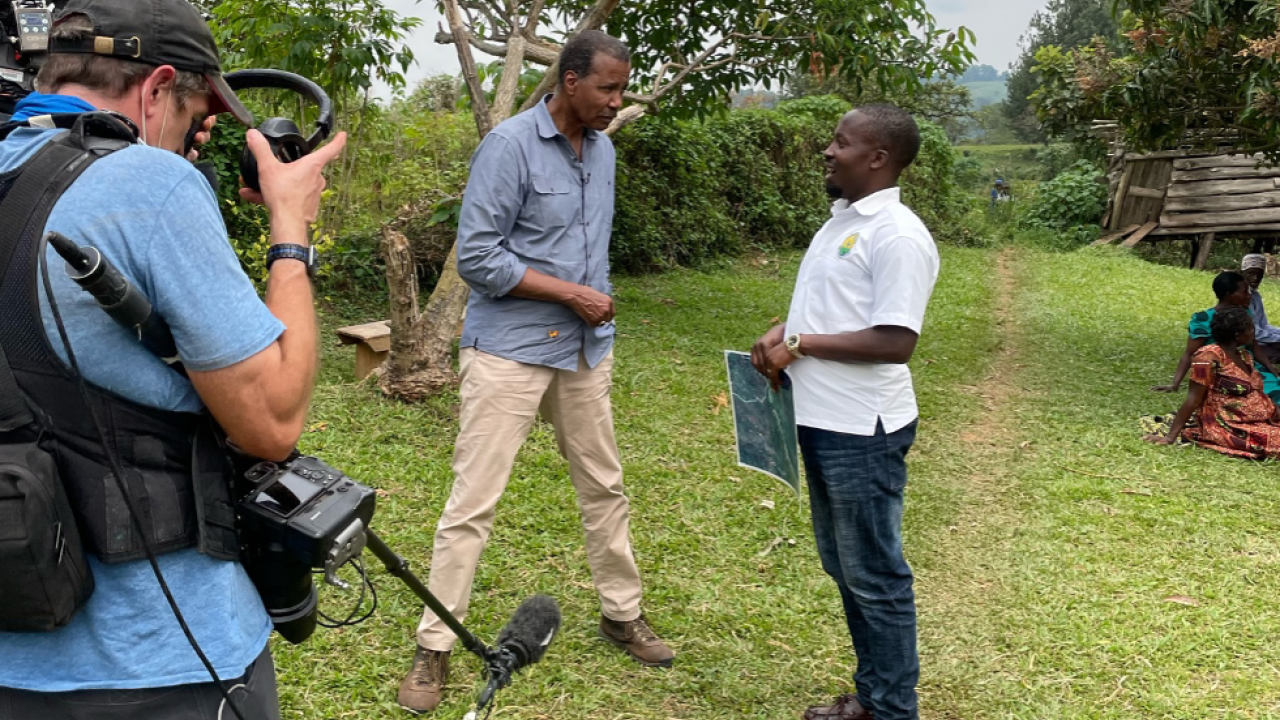
Epi-Intelligence in Uganda
Studying emerging infectious diseases at the interface of humans, animals and the environment takes collaboration, local experts and perseverance
Watching the mist roll over the tea fields and cross into the Bwindi Impenetrable Forest in Uganda, it seems impossible to imagine that the looming vines and canopy standing in front of us is not an impermeable wall dividing humans from the animals and microbes of the forest. A team of One Health scientists studying zoonotic disease knows otherwise. A virus emerging from this forest or any forest in sub-Saharan Africa could happen at any moment and quickly travel to a major metropolis in a matter of days, if not hours.

The Bwindi Community Hospital, Uganda Virus Research Institute, and Gorilla Doctors partnered with the University of California, Davis to study this risk through our Research Center, the Epicenter for Emerging Infectious Disease Intelligence (NIAID award U01AI151814), that is part of the CREID Network. In collaboration with the Uganda Wildlife Authority (UWA), we are using the Bwindi Impenetrable Forest as a model to better understand how viruses emerge from the forest and human interactions with animals facilitate transmission and spread.

While Bwindi and its borders are well preserved and cared for, the Bwindi Community Hospital, with its location on the forest edge, is perfectly positioned to better understand what we call “index cases of zoonotic virus spillover”, or the first cases of a known or new virus that originates in an animal and infects a person. Through its village health team networks (VHTs), the Bwindi Community Hospital also has one of the most in-depth community outreach programs this close to a national park. Mr. Nahabwe Haven, Lead Human Surveillance coordinator for the Epicenter, and his team of researchers from the Bwindi Community Hospital have been working with these frontline public health workers since the program’s inception. “Our village health teams provide a rare opportunity to have eyes and ears on the ground looking for new or strange clusters of disease that could have emerged from animals.” Mr. Nahabwe Haven describes.

One of the objectives of this research is to conduct coordinated surveillance of humans, bats, primates and mosquitoes in the same areas at the same time, to better understand potential cross-species transmission patterns. Accessing the rural communities most likely to have contact with these wildlife species and enrolling them in the study is an important and often time-consuming aspect of the research. “We want to identify those that are at risk of a zoonotic infection and with the help of VHTs, we are able to identify those very early clinical symptoms, such as fevers and conduct advanced viral analyses”, says Mr. Haven. “The work that we do is focused on identifying outbreaks early, and ideally at the initial point of spillover so that we can make timely interventions”. This is very important in remote areas where there are limited public health facilities and resources. “The role of VHTs and rural health facilities and the public health surveillance system is essential for controlling spillover and this cannot be overemphasized, particularly now when there is an ongoing outbreak of Ebola in Uganda”.
“Our work with emerging infectious diseases also involves people’s behavior” Mr. Haven continues. “We need to understand what behaviors are contributing to zoonotic spillover. For example, sometimes sick animals are consumed. We want to understand which areas and which beliefs people have that may increase the risk of people contracting zoonotic diseases from both wild and domestic animals in the region.” Human health and livelihoods are intimately tied to the health and stewardship of the Bwindi Impenetrable forest in this region and understanding people’s beliefs around these subjects is a critical part of the research.
The work of BCH physicians and public health experts is coupled with the work of Gorilla Doctors, a decade long collaboration which has uniquely allowed a One Health Approach to surveillance in the region – examining humans and wildlife in overlapping space and time. All specimens collected through this surveillance program are then sent to the Uganda Virus Research Institute (UVRI), the leading virology institute in Uganda and tested for a broad range of known and potentially unknown viral pathogens.
The University of California, Davis is privileged to partner with these leading experts on emerging infectious diseases in Uganda, working on what we believe to be one of the most important areas of research - the emergence of future pandemic diseases and how human alteration and stewardship of our forests impacts animal and human health.
See this work featured on the 60 Minutes below:
